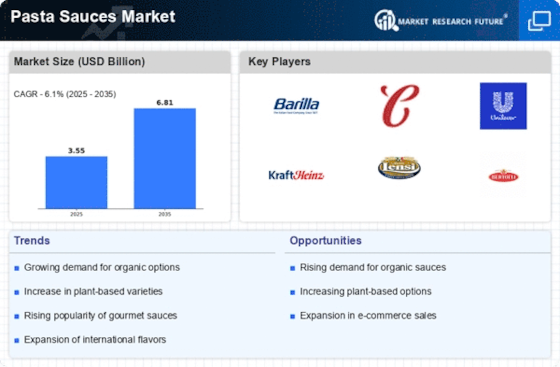Top Industry Leaders in the Pasta Sauces Market

The pasta sauces market is a highly competitive landscape, driven by evolving consumer preferences and a growing demand for convenience in meal preparation. Key players in this market have employed various strategies to gain a competitive edge, ranging from product innovation to strategic partnerships. As of 2023, several factors contribute to the market share analysis, including distribution networks, brand recognition, and responsiveness to changing consumer needs.
Key Players:
- Mizkan Co. (Japan)
- Barilla S.p.A. (Italy)
- Mars Incorporated (US)
- ConAgra Foods Inc. (US)
- The Kraft Heinz Company (US)
- Amy's Kitchen (US)
- Newman Own Co. (US)
- B&G Foods Holdings Corp. (US)
- Premier Foods PLC (UK)
- Campbell Soup Company (US)
Strategies Adopted:
To maintain and enhance their market positions, key players have implemented diverse strategies. Product innovation remains a key focus, with companies constantly introducing new flavors and healthier variants to meet the evolving demands of health-conscious consumers. Additionally, strategic partnerships with retailers and e-commerce platforms have facilitated wider product reach and accessibility. Some players have also invested in marketing campaigns to strengthen brand awareness and loyalty.
Factors for Market Share Analysis:
Several factors contribute to the market share analysis of pasta sauces. Distribution channels play a crucial role, as companies with extensive and efficient distribution networks can reach a larger consumer base. Brand recognition and loyalty are also significant determinants, as consumers often opt for trusted and well-known brands. Pricing strategies and the ability to adapt to regional taste preferences further influence market share.
New and Emerging Companies:
While established players dominate the market, new and emerging companies are making notable strides. These entrants often focus on niche markets or specific product attributes, such as organic or gluten-free pasta sauces. Emerging players include Rao's Homemade, Dave's Gourmet, and Seggiano. These companies leverage agility and innovation to carve a niche for themselves in a market traditionally dominated by larger corporations.
Industry News and Current Company Investment Trends:
The pasta sauces market has witnessed notable industry news and investment trends in recent times. Companies are increasingly investing in research and development to create unique and differentiated products. Mergers and acquisitions are also prevalent, with larger companies acquiring smaller ones to expand their product portfolios or gain access to new markets. Investments in sustainable packaging and production processes have become a trend, reflecting the growing consumer awareness of environmental concerns.
Overall Competitive Scenario:
The competitive scenario in the pasta sauces market is characterized by intense rivalry among key players vying for market share. The market dynamics are influenced by factors such as consumer preferences, regulatory changes, and economic conditions. Companies continually adapt their strategies to stay ahead in this competitive landscape, with a keen focus on innovation, quality, and cost-effectiveness.
Recent Developments
The pasta sauces market witnessed several notable developments. Nestle, a leading player, expanded its product line by introducing a range of plant-based pasta sauces to cater to the rising demand for vegetarian and vegan options. Concurrently, The Kraft Heinz Company announced a strategic partnership with a major e-commerce platform to enhance its online presence and make its products more accessible to consumers. Barilla, known for its traditional pasta sauces, introduced a limited-edition line featuring exotic flavors inspired by global cuisines, aiming to captivate adventurous consumers.
Dave's Gourmet, an emerging player, secured a substantial investment to scale up production and expand its distribution network. This move reflects the growing investor confidence in the potential of smaller, innovative brands within the pasta sauces market. Such developments indicate a dynamic and evolving landscape where companies are proactive in adapting to consumer trends, exploring new markets, and embracing innovation to maintain their competitiveness.











